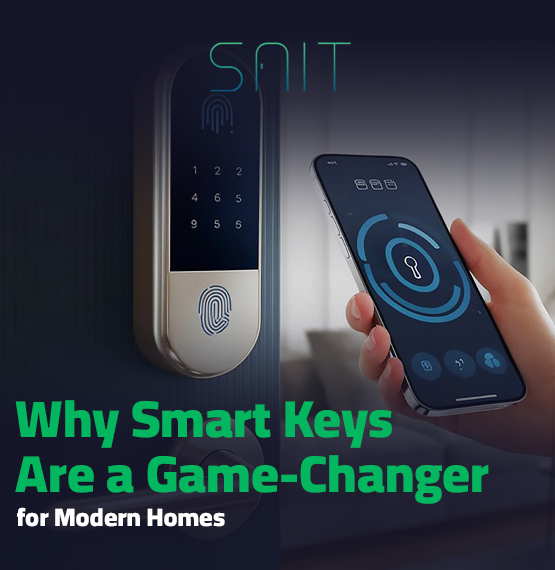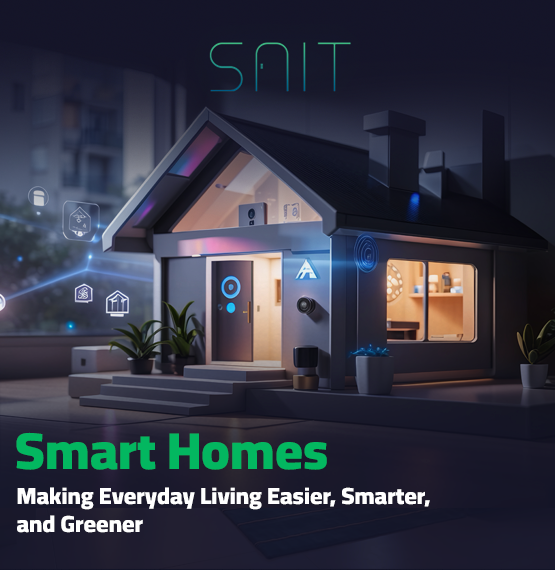AI has been evolving over the years and it is not just AI chatbots and AI assistants, we’ve seen AI become a steady part of businesses making it not just a trend but an evolution in many industries, nonetheless in homes AI has been integrated in smart homes to produce a new concept of intelligent homes, a smart home that predicts and even thinks instead of you, where AI merges with smart technology solutions to create living spaces that are more comfortable, secure, and sustainable.
In this blog we are going to deep dive into the concept and uses of AI in smart homes, and how it can change your daily living.
What Makes a Smart Home Different?
It’s easy to confuse smart home technology with traditional home automation. The difference lies in intelligence.
Home automation generally uses fixed wiring and specific protocols to control devices. It’s rigid, limited, and often difficult to expand. A smart home, on the other hand, relies on AI-powered devices connected through Wi-Fi and other networks. With smart touch interfaces and smart control, you can manage lighting, temperature, entertainment, and even security through your phone or voice, no complex installations required.
This flexibility is what makes smart homes so practical. You can start small, maybe with a smart touch switch for your lights, and expand gradually into a fully integrated ecosystem.
Why AI Matters in Smart Homes
What truly makes a smart home “smart” is the AI working behind the scenes. AI is not just about convenience, it’s about adaptability, learning, and personalization.
1. Adaptation and learning
Home smart systems learn your everyday habits. They can tell when you usually wake up and automatically open the curtains, adjust the thermostat, and even prepare your morning coffee to start your day perfectly.. This kind of smart control saves time and creates a smoother daily flow.
2. Voice Control and Hands-Free Living
With voice assistants integrated into smart technology solutions, you don’t need to lift a finger. Just say the word, and you can dim the lights, play your favorite playlist, or lock the doors. AI processes natural language and adapts to your voice patterns over time, making interactions faster and more accurate.
3. Device Integration
One of the greatest strengths of AI in the smart home is its ability to connect everything into one ecosystem. From security cameras and smart locks to speakers and appliances, AI ensures that all your devices work together for maximum comfort and security.
4. Prediction of Needs
AI doesn’t just follow commands it predicts. It knows when you usually brew coffee, what temperature you prefer before bedtime, and when to activate security systems. This predictive power creates a seamless living experience.
5. Enhanced Security
Security is a top priority in modern homes. With an advanced security system powered by AI-enabled cameras, you can recognize familiar faces, detect unusual movements, and receive instant alerts right on your smartphone.
Systems can even lock doors automatically or trigger alarms when threats are detected. With AI, peace of mind becomes a built-in feature of your smart home.
Smart Homes and Energy Savings
Convenience is just one side of the story. Another major benefit of AI-powered smart homes is energy efficiency.
Traditional homes waste a significant amount of electricity and resources. With smart control, AI makes sure nothing is used unnecessarily.
- Smart lighting turns off when rooms are empty.
- Heating and cooling systems adjust based on occupancy and weather conditions.
- Smart appliances can run at off-peak hours to save money.
This isn’t just about cutting costs on electricity bills it’s also about reducing environmental impact. Smart homes represent a step toward greener living, and in a world where sustainability matters more than ever, this is a powerful advantage.
The role of Smart Touch and Smart Control
A key part of the smart home experience is effortless control. Smart touch panels and mobile apps give you instant access to every system in your space. Whether you’re adjusting the lighting, checking your cameras, setting the thermostat, or activating your scent diffuser, smart control keeps everything right at your fingertips.
Combined with voice assistants, this creates a dual control environment hands-on when you want it, hands-free when you don’t. It’s this flexibility that makes smart technology solutions so appealing.
Personalization via machine learning
The longer you live in a smart home, the smarter it gets. Thanks to machine learning, AI constantly studies your behavior and adapts. Over time, it learns your routines, preferences, and even the way you speak.
- The lights turn off automatically when the room is empty.
- The temperature adjusts according to your daily preferences.
- Voice assistants differentiate between family members and provide personalized responses.
This customization gives you the feeling that the house was designed especially for you.
The Future of Smart Homes
We’re only at the beginning of the AI journey into smart homes. The future promises more integration between devices, more energy-efficient systems, and intelligence that can predict your needs before you even realize it.
Privacy and digital security issues may still be a concern, but as smart devices evolve, stronger security systems are being built to ensure that convenience never comes at the expense of security.
Conclusion
Rise with AI-powered smart homes—this isn’t just a trend, it’s the next evolution of modern living. With touch screens, intelligent control systems, smart Switches, upgraded Sockets, and seamless Smart Keys integration, you can enjoy unmatched comfort, advanced security, and superior energy efficiency.
In short, AI is transforming the way we live, making the smart home the real future.
FAQs
What is the difference between smart homes and traditional homes?
Smart homes rely on artificial intelligence and smart devices such as smart touch (touch control) and smart control, making the smart home able to adapt to your daily needs and save energy better compared to traditional homes.
How does AI enhance security in a smart home?
A smart home uses technologies such as a smart door lock, cameras and sensors to increase security. A smart home can automatically close doors, monitor any abnormal movement, and protect the family around the clock.
What is the role of Smart Touch inside a smart home?
Smart Touch provides easy one-touch control of lighting, air conditioning, and entertainment devices. When combined with smart control systems, the smart home living experience becomes more comfortable and smarter.
Does a smart home save energy?
Yes, Smart homes rely on artificial intelligence to achieve energy savings. Lights turn off when you leave the room, air conditioning systems adapt to the weather, and smart appliances work efficiently to minimize electricity consumption.





